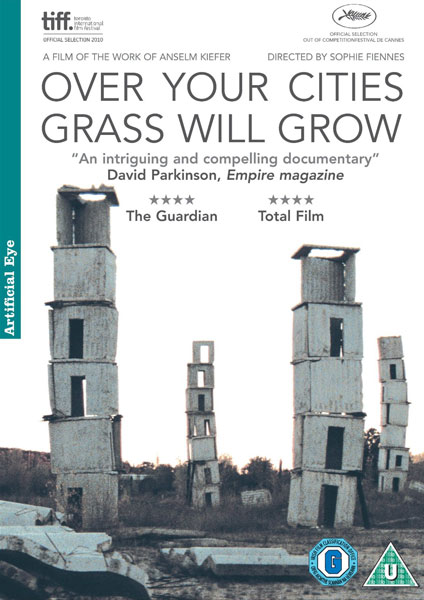
Over Your Cities Grass Will Grow

OVER YOUR CITIES GRASS WILL GROW (DVD)
Artificial Eye
Release date: March 14th 2011
Certificate (UK): U
Running time: 100 minutes
Director: Sophie Fiennes
Cast: Anselm Kiefer

“If we consider the works in their untouched actuality and do not deceive ourselves, the result is that the works are as naturally present as are things.” ~ Martin Heidegger, The Origin of the Work of Art
German art has long been an interest of mine. In the few years I spent living in Berlin in the late 90’s I soaked up everything the Alte Nationalgalerie, Neue Nationalgalerie and the Vitra Design Museum had to offer.
Even buildings like the Reichstag, with its new dome by Sir Norman Foster, the red Info Box (no longer there now) on Potsdamer Platz and the Jüdisches Museum are works of art in themselves.
Yet I’d never heard of Anselm Kiefer, a painter and sculptor from the German town of Donaueschingen. Kiefer’s work is characterised by his use of lead, concrete, ash, acid, earth, glass and gold. He combines it with elements of mysticism, Kabbalah and the influence of the poems by Paul Celan to create works which reflect history, literature, philosophy and the relationship between nature and culture.
In the early ’90s Kiefer moved from Germany to France. His 35 hectares studio in an abandoned silk factory in Barjac is described as a “Gesamtkunstwerk” (total work of art) and this is where we follow him.
He calls it “La Ribaute”. Cavernous rooms, moulded columns and towering blocks are just some of the things you will encounter as the camera pans slowly, pulling you in. It’s eerie, inviting and for the most part silent, leaving you to gather your thoughts and feelings.

We also follow the artist at work, getting a glimpse into the intricate process of creation; giant molars are painted, blocks of concrete are lifted, huge panes of glass are trashed and grounds are excavated.
As the subject raises questions about the nature and origins of a work of art, so too does the film. Is it a work of art itself? They both bleed into each other and the observer becomes the observed along with Kiefer’s work.
It’s beautifully shot in cinemascope and features musical arrangements by György Widmann and György Ligeti while it lets us observe. In some moments, the visual focus of the documentary reminds me of Russian Ark (2002) by Alexander Sokurov, but with its contemplative images and sounds, it has its own rhythm and mood which makes Over Your Cities Grass Will Grow a “Gesamtkunstwerk” in its own right.
Kiefer now works in Paris, having left La Ribaute in 2008. Everything he created in the time there remains, but now it is left to nature to add its own brushstrokes to an ever evolving masterpiece.

Patrick Samuel
The founder of Static Mass Emporium and one of its Editors in Chief is an emerging artist with a philosophy degree, working primarily with pastels and graphite pencils, but he also enjoys experimenting with water colours, acrylics, glass and oil paints.
Being on the autistic spectrum with Asperger’s Syndrome, he is stimulated by bold, contrasting colours, intricate details, multiple textures, and varying shades of light and dark. Patrick's work extends to sound and video, and when not drawing or painting, he can be found working on projects he shares online with his followers.
Patrick returned to drawing and painting after a prolonged break in December 2016 as part of his daily art therapy, and is now making the transition to being a full-time artist. As a spokesperson for autism awareness, he also gives talks and presentations on the benefits of creative therapy.
Static Mass is where he lives his passion for film and writing about it. A fan of film classics, documentaries and science fiction, Patrick prefers films with an impeccable way of storytelling that reflect on the human condition.
© 2022 STATIC MASS EMPORIUM . All Rights Reserved. Powered by METATEMPUS | creative.timeless.personal. | DISCLAIMER, TERMS & CONDITIONS
HOME | ABOUT | CONTACT | TWITTER | GOOGLE+ | FACEBOOK | TUMBLR | YOUTUBE | RSS FEED
CINEMA REVIEWS | BLU-RAY & DVD | THE EMPORIUM | DOCUMENTARIES | WORLD CINEMA | CULT MOVIES | INDIAN CINEMA | EARLY CINEMA
MOVIE CLASSICS | DECONSTRUCTING CINEMA | SOUNDTRACKS | INTERVIEWS | THE DIRECTOR’S CHAIR | JAPANESE CINEMA





